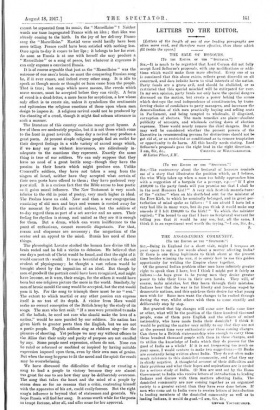THE ANOLO-INDIAN COMUCNITY.
[To THE EDITOR OP TM SrEcrwroa."I
Sul,—Being in England for a short visit, might I trespass on your space to say a few words about a matter affecting India? If there is one thing legitimate to think about at the present time besides winning the war, it is surely how to use this golden opportunity for welding the Empire closer together.
Of the general Indian problem other men have infinitely greater right to speak than I have, but I think I might put it fairly as follows:—As boys grow to be young men they desire greater power to take their lives in their own hands. They will, of course, make mistakes, but they learn through their mistakes. Indians hear that the war is for liberty and freedom waged by democratic nations, and this quickens their desire for what young men wish for Some men want the changes to be rushed through during the war, whilst others wish them to come steadily and deliberately step by step.
But granted that big changes will come over India some time or other, what will be the position of the three hundred thousand people, some of them pure English and the others of mixed nationality, who have made India their domicile? I think it would be putting the matter very mildly to say that they are not at the present time very enthusiastic over these coming changes. Can there be a British statesmanship wise enough to carry these three hundred thousand people with them in these changes, and to utilize the knowledge of India which they do possess for the good of India as a whole? If it is not trespassing too much on your space, I would venture to make two suggestions:—(1) Books are constantly being written about India. They do not often make much reference to this domiciled community, and what they /My is chiefly negative. A thoughtful account of their difficulties and their problems and what their hopes and aspirations are is needed for a serious study of India. (2) Men are sent out by the Home Government to India who receive letters of introduction to leading Indians and discuss with them matters affecting India. The domiciled community are now coming together as an organized society to a greater extent than they have ever done before. If men who coma out to India were to receive letters of introduction to leading: members of the domiciled community as well as to leading Indiana, it would do.goed.—I em, Sir, &c.,
OSWALD YOlitiOHCSOAX1).


























 Previous page
Previous page